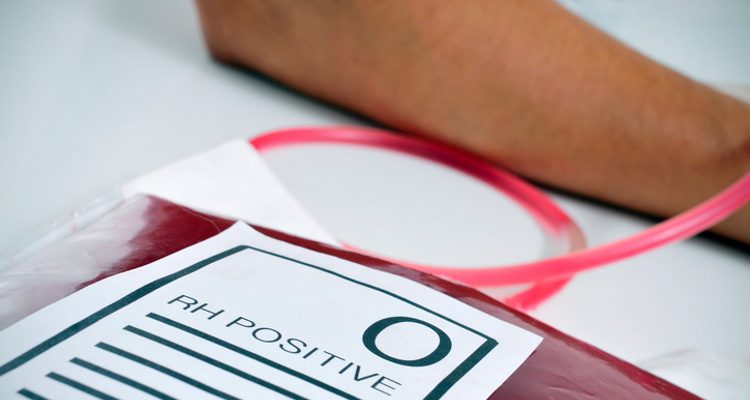
One of the latest diet fads is the blood type diet. Although this approach is based on our blood types, it lacks scientific evidence. This diet, recommended by Peter J. D’Adamo, is based on the theory that different blood types A, B, and O react differently to the food you eat.
In fact, they react differently to various factors such as stress and anxiety. D’Adamo claims that people with a particular blood type are susceptible to certain diseases or health conditions.
Antigens A, B, and O are genetic markers and are present everywhere in our body. These markers bind with certain food ingredients such as lectins (a protein) and cause agglutination of blood.
This leads to various skin conditions and digestion issues. Also, our gut bacteria or the normal flora in our body, which aid in digestion, differ with each blood type. This factor also seems to influence the way our food is digested.
Hence, D’Adamo recommends eating food suitable for our blood type. A person with blood type A, for example, would not flourish on a blood type O diet.
But do these diets really work? Does your blood type really influence the way your body processes food? In this article, we’ll examine the blood type O diet, outlining the blood type O diet foods to eat. A breakdown of the blood type O diet food list may help you figure out whether the diet will work for you or if it even works at all.
How the Blood Type O Diet is Supposed to Work
As we previously noted, all of the blood type diets have different dietary directions. The idea is that you eat right for your blood type.
In the case of blood type O diets, the theory is that those of blood type O have hunter ancestors that ate a lot of meat and fish that could be hunted or caught. These ancestors also only ate certain types of vegetables and fruits. This also revolves around what might help ailments that people of blood type O may suffer from.
When speaking in these broad terms, it sounds like it makes sense. However, when you start breaking it down, much of it does not.
There’s not a lot of science to actually back up any of this and more and more, the science is pointing to how this doesn’t make sense for everyone. Just because someone may be blood type O, doesn’t mean they have the same background or issues as another person of blood type O.
The blood type diet considers ancestors in the broadest of strokes. A native Canadian, for example, may be of type O blood like his friend who is from South Africa, but that doesn’t mean they have the same ancestors—not by a long shot. This can be completely shown in the diets’ various food lists.
Blood Type O Diet: Foods You Are Supposed to Eat
For the type O diet, you are supposed to go heavy on the proteins but not so much on the vegetables, and processed foods are not allowed. It doesn’t sound like a bad idea until you start dissecting it a little more.
In terms of meats, you are supposed to stick with lean meats. Lean cuts of beef, mutton, veal, venison, and meats of other animals that the blood type O ancestors would hunt and farm are featured on the list.
Fish would include cold water types like cod, herring, and mackerel. Seafood is recommended as it can help with thyroid issues that can occur within people of blood type O but not all seafood.
Octopus, caviar, smoked salmon, and catfish are allowed and recommended. Vegetables are very limited on a blood type O diet as most are to be avoided. Kale, broccoli, spinach, dandelion, garlic and a few others are allowed, but most vegetables are to be eaten on a limited basis or not at all.
The main flaw in the blood type diets is that while it looks kind of cool, it doesn’t account for something as simple as all blood types not sharing the same ancestors.
The diet above fits fine if your background is European, but what about someone with blood type O of South American heritage? Many of food products listed above may have never been available to that person’s ancestors. If that’s the case, does the diet work? Do any of the blood type diets work?
That’s not to say that this diet is bad for you. Lean meats are a good idea as is plenty of fish in the diet.
But lean protein is important for a good diet in general and has nothing to do with blood type or ancestors. After you see the selection of food you aren’t supposed to eat, we can delve a little further.
Blood Type O Diet: Food You Are Not Supposed to Eat
For the O type blood diets, you are supposed to go heavy on the protein and meat, but there are some meats that are off limits. All versions of pork (bacon, ham, pork chops, etc.) are not allowed. Goose is also off the list. All processed meats (like luncheon meats) are also not accepted.
Most seafood is not allowed as well as many vegetables. Eggplants, potatoes, corn, and all sorts of mushrooms and sprouts are to be avoided. Most fruits are off the list, especially melons, most berries, oranges, and coconut.
The theory, once again, is that if your ancestors could not have hunted it, then you shouldn’t be eating it. And once again, blood type diets don’t take into account the diversity of heritage.
Good Points and Bad Points
Now that we’ve debunked much of the blood type diet—especially the blood type O diet— there should be a few things noted. While the science is inconclusive, the blood type O diet does have some good ideas to it.
Lean meats, for example, should be eaten over more fatty cuts and types. Eating a lot of fish is also a good idea. Not eating processed meat is also a pretty good tip as processed meat tends to have higher sodium levels and aren’t as good for you as a cut of meat.
That being said, adding more vegetables to your diet than what the blood type O diet recommends would also be a good idea, especially anything high in fiber. Once again, it should be noted that benefits of this diet are not proven to relate to blood type.
Related:
Sources:
Watson, S., “The Blood Type Diet”, WebMD, http://www.webmd.com/diet/a-z/blood-type-diet
D’Adamo, J., “Blood Type and Your Health,” Dadamo; http://www.dadamo.com/txt/index.pl?1001
“Blood Groups and Red Cell Antigens,” National Center for Biotechnology Information; https://www.ncbi.nlm.nih.gov/books/NBK2267/
Leech, J., “The Blood Type Diet: An Evidence-Based Review”, Authority Nutrition, https://authoritynutrition.com/the-blood-type-diet-review/













